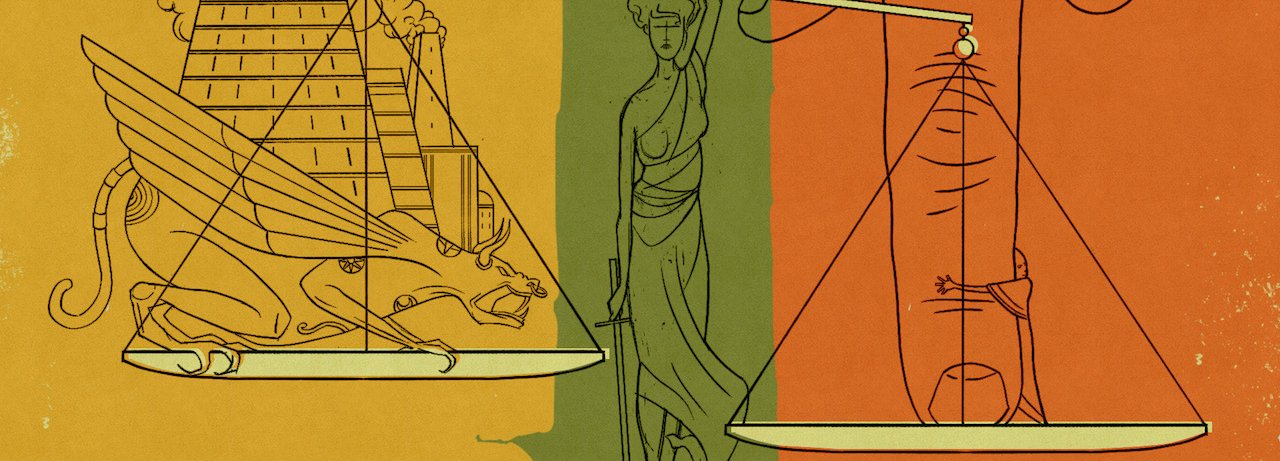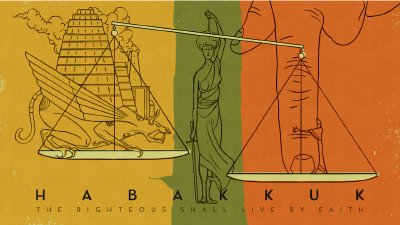


Habakkuk
What Makes A Feast?
November 19, 2023 • Rev. Joshua Smith • Habakkuk 3:16–19
We’re wrapping up a whole semester of sermons haunted by the prophecy of Habakkuk. His potent and provocative image of a world “filled with the knowledge of the glory of the Lord” has influenced our own vision statement: “Saturating our neighborhoods with feasting families who tell a better story by setting tables of God’s grace for the lonely.” So, as our energy turns toward family holidays over the next several weeks, I think it would be helpful for us to consider just what exactly elevates a shared meal to the status of a feast. There are three main features that overlap to form a feast – focuses that make sure our holidays are holydays: Love – Genuine affection for and self-denying service of both family and guests. Luxury – Gratuitous sensual provision, far beyond what is necessary for survival. Liturgy – Grateful acknowledgement of God’s glorious story in every event and detail. All three of these features are needed for a Biblical feast, and to neglect one or two is to miss out on the formative practice altogether. We may be more naturally bent toward one or two of these, but it takes all three to keep the feast. When we neglect an aspect, we end up with some of the malforming traditions that we see Jesus rebuke in the gospel of Luke: Asceticism - Liturgy and love without luxury means we’ve not tasted and seen (https://stpatrickpres.us4.list-manage.com/track/click?u=ba3413bb6fa020132a4bc21a5&id=76cf838183&e=b77c6e6023) Epicureans - Luxury and love without liturgy means we’re sensuous idolaters (https://stpatrickpres.us4.list-manage.com/track/click?u=ba3413bb6fa020132a4bc21a5&id=19645f3db1&e=b77c6e6023) Pharisees - Luxury and liturgy without love means we have nothing (https://stpatrickpres.us4.list-manage.com/track/click?u=ba3413bb6fa020132a4bc21a5&id=5a83b58e77&e=b77c6e6023) Only by remembering the cross, that is, by reflecting and acting on the sacrificial nature of each of these elements, can we be drawn into the center; lifted up to the mountain of the Lord. Let me assure you, this is not an optional add-on for seasons of plenty. You’ll need this. The urgency really hit home for me last week as I retreated with some close pastor friends. Our time culminated in a unique culinary experience that I can only describe as sublime. We got to stand with the chef and even participate in his priestly work, and then he actually sat down to enjoy his phenomenal, savory craftsmanship with us. Several in our party knew that his family had been grieving a terrible tragedy, but that night he shared the horrific extent of the injustice. We found ourselves in a strange place, eating a phenomenal meal while bawling our eyes out. The lines between conversation and prayer wavered continuously. Toward the end of the night, he said, “This is why I cook. I’m wagering my life on the belief that what happens at the table is truer than the darkness outside.” We all knew that meal was a holy moment. If any part of it had been lacking – the genuine love we have for one another, the gratuitousness of food and drink, or the grateful acknowledgment of God’s sovereignty in it all – it simply could not have been the gift that it was. He had been in a wilderness, and moments like this were the means of grace he (and we) desperately needed to make it through. To rejoice. This Sunday, we’ll wrap up our study in Habakkuk with a similar sentiment. The prophet, with full knowledge of Israel’s impending judgment at the hands of savage idolaters, doubles down on the joy of the Lord. I know of no more formative practice for shaping our hearts for that kind of joy than to keep the feast. So, I hope you can find ways in the weeks to come, whether modest or epic, to invest in just a bit more liturgy, love, and luxury for your tables.
The Transforming Vision
November 12, 2023 • Rev. James M. Holland • Habakkuk 3:1–16
Most of my aquatic experience with boats has been with the motorized variety, but not all... I have known the thrill of taking a skirted kayak down river rapids in North Carolina, or the more mundane pleasure of working a canoe down a stream in Arkansas or Tennessee. While in Mississippi, my experience on the water was fishing farm ponds, using a single paddle to move the boat along. Only a few times have I been in an actual row boat, the kind that has two oars that fit in oarlocks (which are a kind of holder that attaches to the gunwale of a boat and acts as a fulcrum for rowing). This work with oars to propel a boat to a destination is different than what you do in a kayak or canoe or paddling a boat. In this position, you actually face the opposite way from where you are trying to head the boat. You are actually looking backwards to go forward. This is actually a good picture of the vision we see in Habakkuk. When faith ebbs, hope is almost extinguished, and the heart is broken, God gives Habakkuk a transforming vision. It is a look back at the gospel event of the Old Testament and a remembrance of what God did for Israel when he took them from slavery to a land of their own. They didn’t get where they are by their own cunning or power, or because they were good or more noble. Out of sheer grace, God came down. And it is not the first time God came down, which we will talk about Sunday as we take a look at the transforming vision the prophet sees. I hope to see you Sunday! Remember, we’ll be hosting a Newcomers Feast this week, so if you are new to St. Patrick, we invite you and your family to stay for lunch. We would love to feast with you and hear your story.
A Future and a Hope
November 5, 2023 • Rev. James M. Holland • Habakkuk 2:4–20
We have just come through Halloween. It is a festive time to be really present in your neighborhood and have some fun while getting your steps in, as you follow wild, costumed children trick-or-treating down the middle of the street. Vats of chili are cooked, hot dogs are roasted, and themed cocktails with outlandish names are served. The reason we do this is somehow lost on us or has been forgotten. In the original sense, Halloween was done to mock evil. Yes, that is right—the way Satan is defeated is through laughter and joy. This week we see something similar in Habakkuk. Without giving too much away, the vision God gives Habakkuk is not only that the just will live by faith alone—sort of socially grinding out a righteousness—no, this week we see the rest of the story. The bulk of the vision is a series of taunts or mockery of evil. Five taunts are leveled at Babylon. It is like God is making fun of Babylon and showing God’s people that, as they live by faith in the midst of a reign of terror, they are not to forget laughter because they can see the rest of the story. Sound weird? Join me Sunday as we unfold this strange passage and then land where the chapter ends—in silence and awe before the glory of a God so vast that he will defeat all the evil in the world, and all will be laughter and joy. Joy is always the final word in the Bible.
The Just Shall Live by Faith
October 29, 2023 • Rev. James M. Holland • Habakkuk 2:2–4
Sometimes you have serendipitous moments in life. We have all had them, usually not big things, like I had this week. I have been fighting armadillo in my yard. Armadillos are right up there with moles as prey that will destroy your flowers, grass, and beds. Not to mention they carry leprosy. Teri is threatening to not plant flowers anymore unless I get rid of them. I have eradicated them in the past when we had an influx of these scaled menaces, but this time I had not been successful. Until the other night. Piper is our dog. She is a therapy dog, bought for that purpose, and she is amazing. However, little did I know there was more to her than meets the eye. We were about to get ready for bed when Piper goes to the bay window in the kitchen and starts trying to tear the window out. I put on a head lamp, opened the garage door, and there it was, rooting up my Zoysia. With little trouble, I eradicate the problem. I was rejoicing over Piper pointing this out and let her in the backyard as a reward. I went by the door a few minutes later, and she is going nuts in the yard. Suspecting she was on to something, I got my headlamp and armadillo eradication equipment and headed out. All I could see as my head lamp zeroed in on the noise was Piper running back and forth and green eyes flashing, obviously cornered in the yard. Teri somehow called Piper off and in less than fifteen minutes—problem solved. The serendipitous moment was realizing that, while I thought I got a therapy dog, I got much more—an Armadillo dog. It is the first one I have ever heard of—quite glorious! I had another one on Thursday when I realized the text for this Sunday, which happens to be Reformation Sunday in the Protestant tradition: “The just shall live by faith”. The phrase that set not only Martin Luther but the whole world on fire in the 16th Century is by God’s providence (and I suspect Josh’s machinations) our text on a day we celebrate our gospel inheritance! Hope to see you Sunday as we continue to ponder the mystery of faith in the book of Habakkuk.
The Crucible of Faith
October 22, 2023 • Rev. James M. Holland • Habakkuk 1:12—2:1
One of the things that keeps coming up among those who have left the faith (or are deconstructing their faith) is that when they brought their doubts about Christianity or matters of faith to their parents, youth leaders, or church leaders, they were told, “We don’t ask those questions here.” Or, "Just accept it on faith.” As if doubt were the cardinal sin or, if you are a believer trusting in Jesus, doubt is not part of a life of faith. Habakkuk would beg to differ. Habakkuk prayed to God for revival at the beginning of the book and God said, I am bringing judgement. We don’t know how long Habakkuk sat in that grim truth before he makes his second complaint to heaven, but when he does, we see faith on fire with all the dynamics of a living person interacting with a God he knows intimately. We see the whole world of a living faith navigating a fallen world, where the unimaginable happens, and it doesn’t resolve into a nice neat box with a ribbon on it. This Sunday we will talk about faith and how it is rooted in reason, how it doubts, and then waits. Part of knowing how to give a reason for the hope that is within us is knowing the context in which we live. Our current thinking in the larger culture pits faith against reason—as if faith were believing in fairy tales, whereas real-thinking people use reason. This week we will deal with hard questions about living in a real and fallen world. I hope you will join us!
Recalled To Life!
October 15, 2023 • Rev. Joshua Smith • Hebrews 10:32–39
I was between meetings in East Memphis last week and thought I would camp out at a coffee shop where one of our residents works part time. Walking in, I ran into a young man I’ve had a few spiritual conversations with but hadn’t seen in a couple of years. He asked what I was preaching on next and when I told him Hebrews 10, his eyes lit up. He quoted the entire passage from memory and said, “But what does it mean!?” Whenever we start talking about how “the righteous shall live by faith,” the conversation inevitably turns to questions of eternal security and the assurance of salvation. How can I know I’m saved? What happens to people who seemed to believe and now have walked away, or “deconstructed,” or apostatized? As Greg mentioned last week, we’re doing an excursus from our current series (taking the scenic route, maybe), to see how the New Testament authors use the key phrase from our Habakkuk series. Now we’ve come to Hebrews 10, which seems to work against a reformed understanding of the perseverance of the saints! I say it seems to, because things are not often as they seem. This brilliant young man had grown up in the church with a Bible scholar for a father, but he couldn’t square his doctrinal tradition with his own experiences of brokenness. That is, he couldn’t until he began to see the passage in light of the Better Story, which I’m looking forward to sharing with you in Word and Sacrament this week. - js
By Faith Alone
October 8, 2023 • Rev. Greg Aydt • Galatians 3:10–14
Let's take a bit of an excursion together! Or more specifically, an excursus. An excursus is a moment where an author moves away from the main topic to take a journey somewhere else that might fill in the main topic with more information and meaning. This is something you find in Moby Dick as Melville devotes entire chapters to ropes and cetology. Or more recently, you can find it in Star Wars with excurses (Solo, Rogue One, etc) giving meaning and depth to the main Skywalker Saga. We've been in the book of Habakkuk for the last three weeks, looking at Habakkuk's burden and the first complaint/response cycle. Before we get into the more well-known second complaint/response cycle with its famous phrase, “the righteous shall live by his faith,” we'll take a two-week excursus to the New Testament to see the ultimate fulfillment of this prophecy. I believe it will provide clearer telos, meaning, and application to the phrase before we encounter it in Habakkuk. This phrase is picked up in Romans, Galatians, and Hebrews and became the rallying cry of the Reformation: sola fide! We are justified by faith alone. But how much faith? What quality of faith? What kind of faith? This can actually be a scary thought for me when my faith seems to waver. Does my righteousness before God also waver? Come find rest in the Gospel of God's good promises and in His faithfulness in Christ for us as we join in worship together this Sunday.
The Mystery of God's Ways
October 1, 2023 • Rev. James M. Holland • Habakkuk 1:5–11
God’s people have always lived and been forced to reckon with the mystery of the way God works. I keep thinking I will get to the end of it and figure out what God is up too. But alas, even at my age I sometimes feel like Clark Griswold in Christmas Vacation, when his cousin Eddie shows up and asks, “You surprised to see us, Clark?” And Clark replies, “Oh, Eddie, if I woke up tomorrow with my head sewn to the carpet I wouldn’t be more surprised than I am now.” The book of Habakkuk forces us to ponder the mystery of God’s ways. Our problem is, we think we have a right to know how our lives, or the world, ought to go. We live limited by time and geography, in a spot the size of a pin head, in the world. We also have devices that keep up in real time to all the human atrocities in the world, and yet we have no agency to do anything about them. We’re left to wonder, “How can this be?” And yet, God sees the whole story from beginning to end, and he can see and orchestrate his grand plan to glorify himself by using even the wickedness of men to praise him and further his kingdom. And, like Habakkuk, all we can do is lament. Join us Sunday, as look at how God answers Habakkuk’s lament. It is not what you think—it is both comforting and confounding, a place where we find ourselves often. Hope to see you here!
The Silence of Heaven
September 24, 2023 • Rev. James M. Holland • Habakkuk 1:1–4
We are not people who can endure silence very long. Trained by iPhones and text messaging, when we hit send, we expect to have a reply immediately. The expected time for response to a message is very short and, if we don’t hear back from one of our loved ones, it is not long before we panic. What if something happened? They must have had a wreck? Maybe they are ignoring me? In our instant message world, we meet silence with panic. Now historically, this was not true. Before cell phones, people didn’t assume the worse if they didn’t hear back from you immediately. Silence from a communication sent usually took a lot longer before panic set in. When Teri and I were dating long distance, over forty years ago, silence before a letter or a phone call communication was measured in days. Now, if I text her a question and she doesn’t answer in a few hours, panic sets in. But what if heaven is silent? What if we pray and pray and we hear no word of comfort or assurance, and the overwhelming evidence around us is that God is absent or just ignoring us? What do we do then? We have a case study this week from a prophet who ministered in a time where God was answering all his prayers and spiritual reform was everywhere… and then crickets! Long he prayed, and silence. What is interesting is how he prayed. We have all been there. As long as we live in a broken world, this will be the world we inhabit; so how do we pray when it seems like God is absent or silent? I can’t wait to talk about it on Sunday. I hope to see you there as we continue in the book of Habakkuk. Also remember, as our crowds have grown larger, please park on the east side of the parking lot to leave room for our guests. If you have small children or have mobility issues, however, feel free to park closer!
Burdens We Can't Unsee
September 17, 2023 • Rev. Joshua Smith • Habakkuk 1:1
This week our staff spent time at Mallard’s Croft in Byhalia, living into the vision of St. Patrick and dreaming of what’s next. We stayed in the 100-year-old manor house, laughing, praying, cooking, pondering, and feasting together. This retreat is a tradition we started several years ago as a way of celebrating the past year and strategically looking ahead at how to best accomplish our goals. It can be easy for anyone to forget how rare and special their situation is, so these opportunities to stop and savor together are a precious remembering that leads to greater unity and hunger for more and better. I have to say, we are having a blast saturating our neighborhoods with feasting families who tell a better story by setting tables of God’s grace for the lonely. In light of both the previous and coming sermon series, we began our time together considering the first verse of Habakkuk. No one knows much about Habakkuk the prophet outside of the “oracle” he saw. Sounds a bit like science fiction, right? Actually, “oracle” is a weird translation: “burden” is how King James puts it, and that’s closer to how the word was used. Habakkuk was deeply concerned about the lack of justice he saw and even more upset by the means God was using to bring it about. And he was letting the Lord hear about it! I think we all know what it’s like to carry a burden. Rarely do we have the option to lay it down, and the weight of it begins to shape the way we see the whole world. Moses was burdened when he saw the Hebrews enslaved to the point that it completely defined the rest of his life. The plight of the poor in India pressed down upon Mother Teresa till she had to leave Albania forever and live among them instead. Habakkuk brought his own burden, the one he shared with and for the people of Israel, to the Lord in prayer. In fact, it was only in laying it before the Almighty God that Habakkuk found the strength to carry his burden at all. So, I hope we’ll see you this weekend, and if you don’t mind, please consider parking on the far east side of the lot this weekend so we can intentionally leave spots for those seeking a seat at the table! - js


